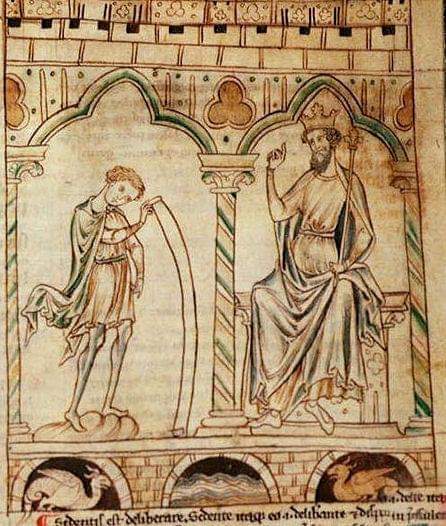
#24 Merlin
Share
Unlike the figure known today, Geoffrey of Monmouth actually combined two characters to create the more famous Merlin. His writings combined existing stories of Myrddin Wyllt (Merlin the Wild) and historical Romano-British war leader Ambrosius Aurelianus. He created Merlin Ambrosius (Myrddin Emrys in Welsh) who became extremely popular, especially in Wales.
However because we are considering Celtic Mythology, we will consider the earlier figure of Myrddin Wyllt. Myrddin was born in the ancient town of Carmarthen in South Wales. Like his contemporary and friend, Taliesin, he is a Bard and wrote several poems in The Black Book of Carmarthen and The Red Book of Hergest.
Later in life, Myrddin served King Gwenddoleu ap Ceidio as Chief Bard in the late sixth century. Gwenddoleu ruled in Arfderydd (now Arthuret) in the area of South-West Scotland and North-West England in the area around Hadrian's Wall and Carlisle. In 573 the Battle of Arfderydd was fought. An allied army of various forces came up against Gwenddoleu, including King Riderch Hael of Strathclyde. After Gwenddoleu was defeated and killed, Myrddin went mad and fled into the Caledonian forest and lived among the animals. Subsequent assassinations and defeats lead to the collapse of Celtic kingdom alliances before the Scots, Angles and Picts.
Although driven mad, whilst living among the animals, Myrddin drew close to nature and developed the gift of prophesy. He predicted future victory for the Celtic peoples of Britain and a time when they would join together and drive the Angles and later the Normans back into the sea. A single Latin translation (from a lost Cornish-language) Prophecy of Merlin exists in the Vatican library.
St. Kentigern (also known as Mungo) comes across Myrddin as a naked, hairy madman in a deserted place. He explains that he was condemned to wander in the company of beasts, because he caused the deaths of all persons killed in battle on the plain between Liddel and Carwannok. Myrddin then leaps up and flees back into the wilderness. He reappears several times more and on the last occasion asks St. Kentigern for the Sacrament and prophesies his own triple death. Later that same day shepherds of King Meldred capture him. He is beaten with clubs, cast into the river Tweed and then pierced by a stake, thus fulfilling his prophecy.
However because we are considering Celtic Mythology, we will consider the earlier figure of Myrddin Wyllt. Myrddin was born in the ancient town of Carmarthen in South Wales. Like his contemporary and friend, Taliesin, he is a Bard and wrote several poems in The Black Book of Carmarthen and The Red Book of Hergest.
Later in life, Myrddin served King Gwenddoleu ap Ceidio as Chief Bard in the late sixth century. Gwenddoleu ruled in Arfderydd (now Arthuret) in the area of South-West Scotland and North-West England in the area around Hadrian's Wall and Carlisle. In 573 the Battle of Arfderydd was fought. An allied army of various forces came up against Gwenddoleu, including King Riderch Hael of Strathclyde. After Gwenddoleu was defeated and killed, Myrddin went mad and fled into the Caledonian forest and lived among the animals. Subsequent assassinations and defeats lead to the collapse of Celtic kingdom alliances before the Scots, Angles and Picts.
Although driven mad, whilst living among the animals, Myrddin drew close to nature and developed the gift of prophesy. He predicted future victory for the Celtic peoples of Britain and a time when they would join together and drive the Angles and later the Normans back into the sea. A single Latin translation (from a lost Cornish-language) Prophecy of Merlin exists in the Vatican library.
St. Kentigern (also known as Mungo) comes across Myrddin as a naked, hairy madman in a deserted place. He explains that he was condemned to wander in the company of beasts, because he caused the deaths of all persons killed in battle on the plain between Liddel and Carwannok. Myrddin then leaps up and flees back into the wilderness. He reappears several times more and on the last occasion asks St. Kentigern for the Sacrament and prophesies his own triple death. Later that same day shepherds of King Meldred capture him. He is beaten with clubs, cast into the river Tweed and then pierced by a stake, thus fulfilling his prophecy.
